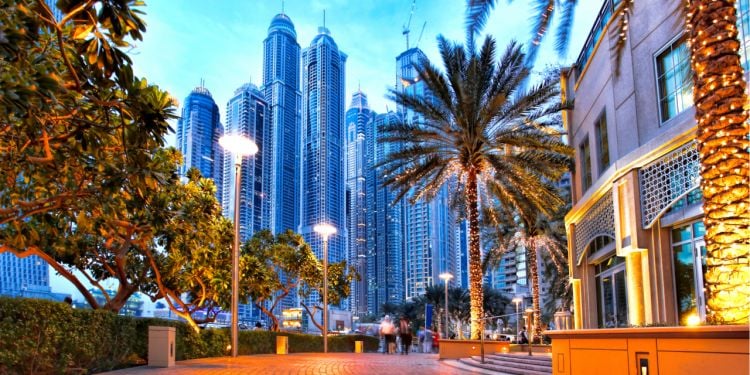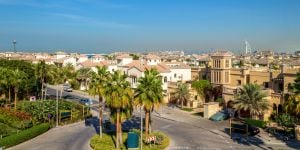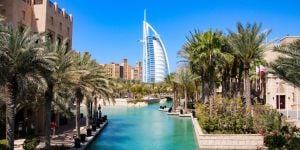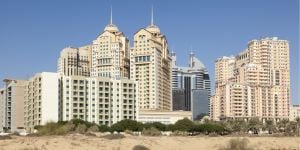
One of the first things you will need to settle when relocating to Dubai is accommodation. If you are relocating to Dubai, you will find many options in terms of accommodation. Dubai is well-known for its luxurious and ultra-modern architecture. It is also possible to find luxury villas here, but these can be quite expensive.
Dubai is an attractive destination for expats — who make up most of the emirate's population. People come here in search of work opportunities and a favorable tax climate: there are no income or corporate taxes in the UAE. This means that foreign workers get to keep all of their salaries, and entrepreneurs have a friendly financial setup for their new companies. With that, the cost of living in Dubai is not cheap — and accommodation is particularly expensive. In fact, a lot of households report spending up to 40% of their income on rent.
You may be assisted for accommodation by your employer prior to your relocation, either by obtaining a housing allowance, or your employer pays the rent for you, which can then be deducted from your monthly salary.
Buy or rent property in Dubai?
The first thing you will need to decide when it comes to accommodation in Dubai is whether you want to buy or rent. Both of these options come with their own sets of pros and cons — and it all depends on what you are looking for and how much you are willing to spend.
Most expats relocating to Dubai are renters. Renting is definitely a good option for when you have just moved to the emirate as it offers lots of flexibility. You can switch between apartments, explore different areas, and even leave Dubai if you wish with no strings attached (although it should be noted that most tenancy contracts are valid for a year). With that, renting can get expensive over a long period of time — and renting options in neighborhoods popular with expats may be limited due to the increasing number of residents in the city.
Buying property in Dubai can be a more fitting option if you plan to stay here for three years or longer. It is also an interesting investment opportunity. Dubai's population is always on the rise — with lots of expats moving to the region in search of professional and business opportunities. This means that accommodation is always in high demand. Though property values are currently on the rise due to growing demand, there are a lot of attractive options to buy property off-plan, with flexible and affordable payment installments. Additionally, investing in real estate in Dubai (upwards of AED 2,000,000) qualifies you for the Golden Visa Program.
Buying property in Dubai
There are three types of properties available to expats in Dubai: freehold properties, commonhold properties, and usufruct properties.
Buying a freehold property grants you full ownership of that property. You can make any alterations to the property that you see fit, rent it out, or sell it. Freehold properties are a highly sought-after investment option by expats, and their supply may be limited. What's more, the availability of freehold properties is limited to certain areas. You won't be able to purchase a property on freehold in older parts of Dubai, such as Bur Dubai or Karama.
Commonhold properties refer to condominiums, apartments, and non-residential units.
When you purchase this type of property, you will have the right to sell it or rent it out. They differ from freehold properties in a way that commonhold properties generally require regular payments for property maintenance. The owners of these buildings are usually real estate companies or property developers.
Usufruct properties are basically properties available or a long-term lease — up to 100 years. You will be able to rent out the property, but you shouldn't make any changes to it — unless these have been approved by the owner.
Types of accommodation in Dubai
There are various types of accommodation available in Dubai. You can find both furnished and unfurnished accommodation, and prices differ on the type of accommodation as well as the location. Some areas are more upmarket than others, such as along the Jumeirah Beach, Palm Jumeirah, Dubai Marina, or DIFC.
You can find apartments in various modern buildings, usually high-rise ones. These tend to have a balcony but no garden. The higher up you go, however, the less likely it will be that your apartment will have a balcony. If you'd like to have a home with a garden, you can check out the townhouses or free-standing villas.
You will have to consider factors that will determine your quality of life, such as the distance of your accommodation from your workplace, as this will impact your commute time, and the proximity of schools and other facilities if you relocate with your family.
Some expats choose to live outside of Dubai and commute to work — for instance, by renting in Ras Al Khaimah.
Popular residential areas in Dubai
Some of the most popular residential areas in Dubai include Jumeirah Lake Towers (JLT), Jumeirah Beach Residence (JBR), Downtown Dubai, Jumeirah Village Circle (JVC) and Town Square.
JLT primarily consists of apartments situated in different clusters, surrounding a lake. It's a busy and bustling area with lots of dining and entertainment options. There is a big park in the area, perfect for kids, and you'll find that sports enthusiasts take walks or runs along the lake. The average costs of apartments in JLT are:
- 1-bedroom – 50,000 to 170,000 AED per year;
- 2-bedroom – 75,000 to 260,000 AED per year;
- 3-bedroom – 125,000 to 400,000 AED per year.
If you are looking for a sea view, consider JBR. This neighborhood has lots of seafront residential complexes and is very well developed. Here, you will find a large shopping mall, a movie theatre, lots of restaurants and coffee shops, and more. Again, you'll primarily find apartments in this area, with a couple of penthouses and duplexes. Its prime location and close proximity to the beach puts it a little bit on the higher end of rental prices. The average costs of apartments in JBR are:
- 1-bedroom – 95,000 to 350,000 AED per year;
- 2-bedroom – 120,000 to 900,000 AED per year;
- 3-bedroom – 160,000 to 1,200,000 AED per year.
Downtown Dubai is perfect if you are looking for a modern cosmopolitan lifestyle. It is where the famous Burj Khalifa and the Dubai Mall are located. The area is home to a lot of office buildings but also has residential options. As you would expect, it offers a range of upscale apartments. The average cost of apartments in Downtown Dubai are:
- 1-bedroom – 80,000 to 400,000 AED per year;
- 2-bedroom – 110,000 to 650,000 AED per year;
- 3-bedroom – 165,000 to 2,000,000 AED per year.
JVC was developed as a residential area and has since become fully equipped with all the amenities you would need on a day-to-day basis. As its name suggests, it is built in a circular shape, with a beautiful lush garden in the center. You'll also find a number of different parks around the area, perfect for families with children. JVC offers a range of apartments and townhouses to suit everyone's needs, although you might find that the townhouses are a little older (but usually well-maintained). The average cost of accommodation in JVC is:
- 1-bedroom – 45,000 to 150,000 AED per year;
- 2-bedroom apartment – 65,000 to 250,000 AED per year;
- 3-bedroom apartment – 95,000 to 265,000 AED per year;
- 2-bedroom townhouse – 150,000 to 200,000 AED per year;
- 3-bedroom townhouse – 155,000 to 220,000 AED per year.
If you're keen on a townhouse that's newer, Town Square is the perfect spot for you. Although it's a little farther away from the city center, many residents have flocked to Town Square for its modern housing options and family-friendly quality of life. The community has plenty of green spaces, a dog park, a community center, cafes and restaurants, and other important amenities nearby. Town Square is split into four smaller communities: Zahra, Naseem, Samaa, and Hayat Boulevard. The average costs of townhouses in Town Square are:
- 3-bedroom townhouse – 135,000 to 200,000 AED per year;
- 4-bedroom townhouse – 170,000 to 260,000 AED per year.
Renting in Dubai
When it comes to renting options in Dubai, you will have a choice of recent or brand-new housing in the city center or on the outskirts. Apartment buildings and villas are generally grouped into compounds and come with different amenities: a swimming pool, sports facilities as well as security or concierge services. If you are willing to spend a bit more, you can search for stand-alone villas that usually come complete with a garden, backyard, private pool, and more.
To rent an apartment in Dubai, you will need to submit the following documents to the owner:
- a copy of your residence permit;
- a copy of your Emirates ID;
- your passport;
- a copy of your payslips.
Make sure to check with your employer whether he will sponsor your accommodation. Sometimes your employer will pay the accommodation rental for you, and an amount will be deducted monthly from your salary. You are therefore advised to discuss this with your employer before you relocate.
Here are a few more things to take into account when renting in the UAE:
- Tenancy contracts are typically signed for a year;
- Rent can be paid quarterly — but some landlords may ask you to make three payments or even pay for a full year of rent in advance. You can sometimes negotiate a monthly payment scheme, although this is rare and will usually increase the total cost of rent;
- You will need to pay a security deposit. Your landlord must give you a receipt, which you need to keep to get your deposit back at the end of your rental contract.
Agent fees typically make up around 5% of the rental value. Expats are generally advised to go through an agent when renting in Dubai to avoid miscommunications and misunderstandings with the landlord.
If you decide to move out before your rental contract is up, you will need to pay a penalty.
Rights and obligations of tenants and landlords in the UAE
There are rules that both landlords and tenants generally need to follow in the UAE. The specifics of your agreement will be drawn out in your rental contract — however, it's always good to have a general idea of what to expect.
Here are some basic rules to follow for landlords and tenants in the UAE:
For landlords
- The landlord must have an English-translated copy of the rental contract ready. Never sign a rental contract if there is no official translation available.
- The landlord must give you a receipt for your security deposit, whether you paid via bank transfer or in cash.
- The price of your rent mustn't be increased throughout the duration of your one-year lease. Once the contract is up, the landlord can increase the price, and it will be up to you to decide whether you want to extend the lease.
- If you are renting a furnished place, make sure the landlord gives you a list of all the items in the apartment. You must then check that the list of items is correct before signing the lease.
- When renting out an apartment in an apartment building, the landlord is responsible for maintaining the common areas (hall, lobby, etc.).
For tenants
- Please carefully study your rental contract before signing it. Once the contract is signed, it is legally binding for both parties, and no changes can be made.
- You are generally allowed to make minor adjustments to the rented property (like changing fixtures). For any major alterations, you will need to get the approval of your landlord — preferably in writing.
- It is illegal to sublet or share an apartment you are renting without written consent from your landlord.
- As a tenant, you must maintain the property in good condition. At the end of your lease, you will need to pay for any damages done to the property.
Important:
A rent check bouncing is a criminal offence in the UAE. If your payment doesn't come through, the landlord also has the right to evict you. Make sure to have your financials in order and always double-check with your landlord about whether they have received the payment.
How to find accommodation in Dubai
To find accommodation in Dubai, you could visit websites like Property Finder, Bayut and Dubizzle. Please make sure that the real estate agents you contact are registered with the Real Estate Regulatory Agency (RERA) to avoid being scammed.
Note that most properties in Dubai are managed by agencies. You will easily find someone who speaks English to work with — and most agencies are used to working with expats and are well aware of their needs. You will also come across property offers directly from landlords. If you do decide to rent a property without the help of an agent, make sure to look carefully over everything you sign. It's strongly recommended that you have someone knowledgeable in lease agreements look over your contract.
If you have come across a particular residential building that you like in Dubai, you can stop by the front office of the building and enquire directly about available rent options.
Good to know:
Couchsurfing, although quite widespread in the country, is not officially authorized.
Useful links:
We do our best to provide accurate and up to date information. However, if you have noticed any inaccuracies in this article, please let us know in the comments section below.












Comments
1